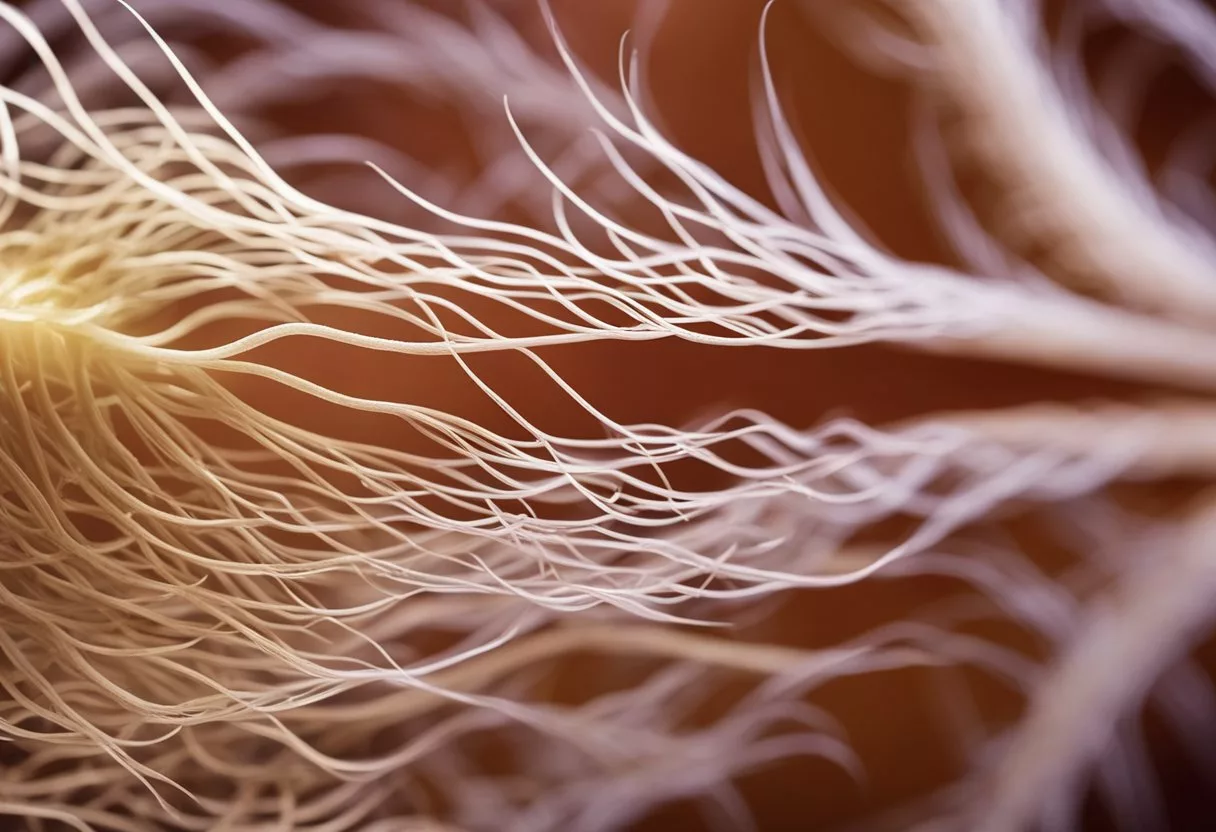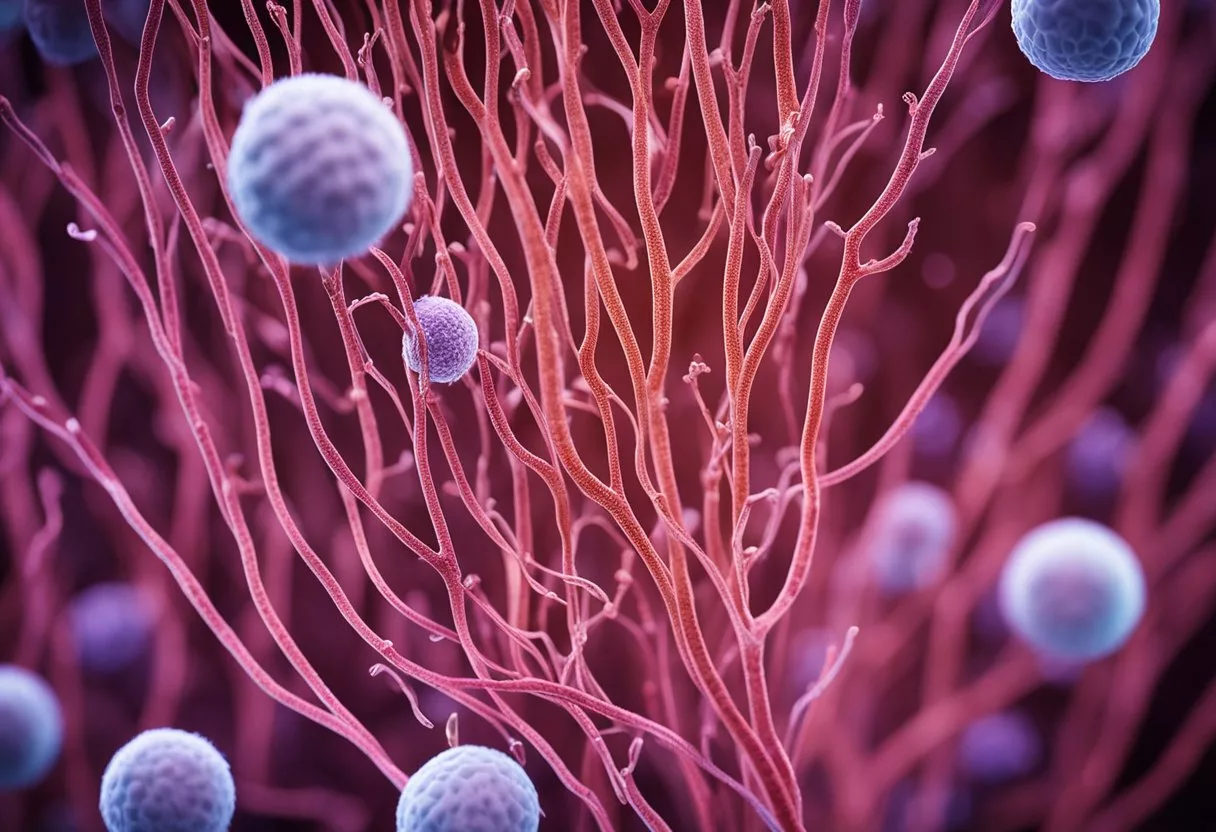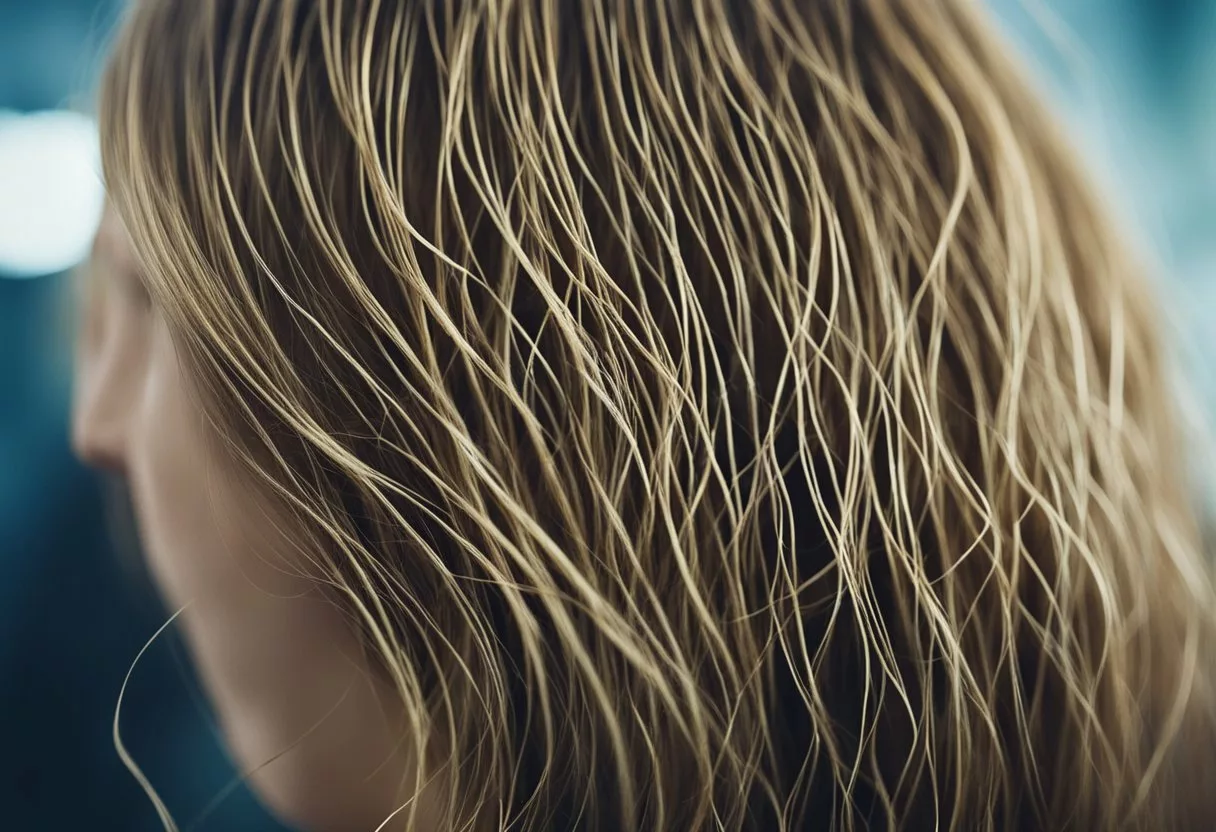Understanding what makes hair grow can be a bit challenging, but there are clear ways to improve hair health and promote growth. Healthy hair growth relies on good nutrition, proper hair care habits, and avoiding harmful practices. While many factors such as genetics and age play a role, taking care of your scalp and hair can make a noticeable difference.

Key steps involve maintaining a balanced diet rich in essential nutrients like proteins, vitamins, and minerals. The right nutrients support the hair follicles and can help hair grow stronger and faster. Additionally, regular scalp massages can improve blood flow to the scalp, promoting healthier hair growth.
Adopting gentle hair care routines and avoiding excessive heat or harsh chemicals also play significant roles. Using products that support hair health, such as moisturizing and thickening shampoos, can reduce breakage and make hair appear fuller.
Key Takeaways
- Healthy hair growth relies on nutrition, good hair care, and avoiding damage.
- A balanced diet and scalp massages are key for promoting hair growth.
- Use gentle hair products to reduce breakage and support fuller hair.
Anatomy of Hair

Hair growth involves complex processes rooted in the structure and function of hair follicles and the stages of the hair growth cycle. These elements are essential in understanding how and why hair grows.
Understanding Hair Follicles
Hair follicles are small, tunnel-shaped structures in the skin’s epidermis. They are responsible for producing hair. Each follicle consists of two main layers: the inner root sheath and the outer root sheath. The inner sheath surrounds the hair shaft and is crucial for shaping the growing hair.
At the base of the follicle lies the hair bulb, which houses the dermal papilla. This region contains blood vessels that deliver nutrients to the growing hair. The dermal papilla is essential for hair development as it regulates the growth and cycling of hair. Additionally, the follicle’s sebaceous glands secrete oils that keep the hair lubricated and healthy. For more information on hair follicles, visit Kenhub.
Hair Growth Cycle
The hair growth cycle consists of four main stages: anagen, catagen, telogen, and exogen.
- Anagen Phase: This is the active growth phase, lasting several years. Most of the hair on the scalp remains in this stage, contributing to its length and volume.
- Catagen Phase: This short transition phase lasts a few weeks. During this time, hair growth stops, and the hair follicle shrinks.
- Telogen Phase: Known as the resting phase, it lasts around three months. Hair does not grow during this period, but it remains attached to the follicle.
- Exogen Phase: This final phase involves the shedding of the old hair. New hair starts growing from the same follicle, pushing out the old strand.
The hair growth rate can vary, but on average, a hair strand grows about 1 cm per month. For further details on the hair growth cycle, check Health.
Biological Factors Influencing Hair Growth

Hair growth is influenced by several biological factors, including genetics, age, and hormonal effects. Each of these plays a significant role in how and when hair grows, as well as in hair loss conditions.
Genetics and Hair Growth
Genetics is a crucial factor in hair growth. The genes inherited from parents determine the texture, color, and growth patterns of hair. Androgenetic alopecia, also known as male or female pattern baldness, is a common genetic condition. This condition results in thinning hair or baldness as people age. Certain genes also affect the number of hair follicles each person has, influencing overall hair density.
Age and Hair Growth
As people age, the rate of hair growth slows down. Hair follicles undergo a process called miniaturization, where they shrink and produce thinner hairs. This is often observed in conditions like androgenetic alopecia. Elderly individuals may experience reduced hair density due to the prolonged resting phase of hair growth cycles. This gradual process leads to an overall reduction in hair volume and quality.
Hormonal Effects on Hair
Hormones have a significant impact on hair growth. Androgens, a group of hormones that include testosterone, can affect the growth cycle of hair. High levels of androgens can lead to hair loss conditions such as alopecia. Hormonal changes during pregnancy, menopause, or thyroid issues also affect hair growth. Hormone replacement therapies can have noticeable effects on both hair growth and loss.
Nutritional Impact on Hair Health

A healthy diet plays a critical role in maintaining strong and vibrant hair. The right nutrients can promote hair growth, strengthen the hair shaft, and prevent hair loss.
Proteins and Hair Structure
Proteins are the building blocks of hair. Hair is predominantly made of a protein called keratin. Consuming high-protein foods helps maintain hair strength and prevent breakage.
Eggs are rich in biotin, a type of B vitamin that helps boost hair growth by aiding in keratin production. Beef liver is another great option, providing essential amino acids along with iron, which can combat hair loss caused by iron deficiency. Legumes, like lentils and beans, offer plant-based protein options that support hair structure and health.
Vitamins and Minerals Essential for Hair
Several vitamins and minerals are crucial for hair health. Biotin supports keratin formation, while Vitamin C promotes collagen production, a protein that strengthens hair.
Zinc is vital for hair tissue growth and repair, with zinc-rich foods like nuts and seeds being beneficial. Iron, found in foods like spinach and lean meats, improves circulation and oxygen delivery to hair follicles. Vitamin D is important as well; its deficiency has been linked to hair loss. Foods such as fish oil and fortified cereals can help maintain adequate levels.
Role of a Balanced Diet
A balanced diet sustains overall hair health by providing a mix of necessary nutrients. Including a variety of fruits, vegetables, grains, and proteins ensures that the hair gets all the essential vitamins and minerals it needs.
Omega-3 and Omega-6 fatty acids found in foods like fish and flax seeds also help in keeping the scalp hydrated and hair shiny. Collagen from bone broth or supplements can improve hair elasticity. Incorporating all these elements in daily meals helps maintain healthy hair growth and overall hair health.
Hair Care Practices

Proper hair care practices can significantly impact hair growth and health. Key areas include how you cleanse, condition, and style your hair. Within each area, paying attention to the right techniques and products can make a big difference.
Effective Hair Cleansing
Regular cleansing helps remove dirt, oil, and product buildup from the scalp. Using a gentle shampoo that suits your hair type is crucial. For those with oily hair, washing 2-3 times a week with a shampoo formulated for oil control is beneficial.
Dry shampoo can be a useful in-between wash to absorb excess oil without stripping natural scalp oils. It’s important to massage the scalp while shampooing to increase blood flow, which may help hair growth.
Conditioning and Moisturizing
Conditioning helps restore moisture after shampooing and makes hair easier to manage. Using a conditioner that matches your hair type is crucial. For those with dry hair, a hydrating conditioner is recommended.
Deep conditioning treatments once a week can help provide extra nourishment. Leave-in conditioners and oils, like argan or coconut oil, can also add moisture and reduce frizz. Applying conditioners primarily to the ends and avoiding the scalp helps prevent greasiness.
Styling and Treatment Considerations
Heat styling tools like blow dryers, flat irons, and curling irons can damage hair if used excessively. To minimize damage, always use heat protectant sprays before styling. Opt for lower heat settings when possible.
Avoid tight hairstyles that pull on the hair, which can lead to breakage. Regular trims are necessary to prevent split ends and maintain hair health. Using dry shampoo sparingly can also help reduce the need for daily washing and heat styling.
Lifestyle Factors Affecting Hair Growth

Lifestyle choices play a vital role in hair health and growth. Key factors include stress management, regular exercise, and quality sleep. These elements can significantly influence how fast and strong hair grows.
The Impact of Stress on Hair
Stress can have a major effect on hair growth. High levels of stress may lead to hair loss conditions such as telogen effluvium, where hair follicles enter the resting phase prematurely and fall out. Chronic stress can also cause hormonal imbalances that negatively impact hair strength and growth.
Practicing stress reduction techniques like meditation, deep breathing, and yoga can help. Reducing stress not only benefits overall health but also supports the growth of healthy, strong hair. People should strive to maintain a balanced lifestyle, managing stress levels to prevent hair issues.
Exercise and Blood Circulation
Regular exercise promotes better blood circulation, which is crucial for hair growth. Improved blood flow brings more oxygen and nutrients to the scalp, feeding hair follicles and encouraging growth. Activities like jogging, cycling, and swimming can enhance circulation effectively.
Exercise also helps in reducing stress levels, thereby indirectly promoting hair health. Moreover, a healthy, active lifestyle can prevent conditions like obesity and chronic disease, which can indirectly affect hair growth. Adopting an active lifestyle is beneficial for stimulating thicker, stronger hair.
Sleep Quality and Hair Regrowth
Quality sleep is essential for hair growth and overall health. During sleep, the body repairs and regenerates cells, including those in hair follicles. Poor sleep patterns can disrupt hormonal balance, particularly levels of melatonin and cortisol, which can negatively impact hair growth.
Ensuring 7-9 hours of sleep per night is recommended for optimal health. Developing good sleep hygiene habits, such as maintaining a regular sleep schedule and creating a comfortable sleeping environment, can aid in better rest. Avoiding screens before bedtime and practicing relaxation techniques can improve sleep quality, thereby supporting healthy hair regrowth.
Medical Considerations

Hair growth can be influenced by various medical factors. Understanding the causes of hair loss, the role of medications, and the types of professional treatments can help in managing and improving hair health.
Understanding Hair Loss Conditions
Different conditions can lead to hair loss. Androgenetic alopecia, commonly known as male or female pattern baldness, is a genetic condition that affects many.
Telogen effluvium is another condition where stress, illness, or other factors cause hair to fall out more easily. This usually occurs after a triggering event, like surgery or childbirth, and leads to diffuse thinning.
Alopecia areata causes sudden hair loss in patches, while trichotillomania is a psychological condition where individuals pull out their hair. Knowing the cause of hair loss is crucial for choosing the appropriate treatment.
Medications and Hair Growth
Medications play a significant role in hair growth. Minoxidil, also known as Rogaine, is a popular topical treatment that can stimulate hair follicles and increase hair density. It works by prolonging the growth phase of hair.
Finasteride is another medication that can help, especially in men. It works by reducing the hormone DHT, which can shrink hair follicles.
Other supplements like biotin, iron, and vitamins may assist if hair loss is due to nutritional deficiencies. However, it’s essential to consult a healthcare provider before starting any medication.
Professional Treatments for Hair Growth
Professional treatments offer targeted solutions for hair growth. Microneedling, which involves using small needles to create micro-injuries on the scalp, can promote hair regrowth. When combined with growth factors, it has shown to be effective.
Laser therapy is another option, using low-level lasers to stimulate hair follicles. Platelet-rich plasma (PRP) treatments involve injecting the patient’s own platelets into the scalp to encourage growth.
For those seeking longer-term solutions, hair transplant surgery can relocate healthy hair follicles to balding areas. These methods vary in effectiveness and cost, so it’s important to discuss options with a specialist.
Natural Remedies and Alternatives

Several natural remedies show promise for promoting hair growth and maintaining a healthy scalp. Some of the most effective methods include the use of essential oils and herbal supplements. These alternatives often rely on natural properties to stimulate hair follicles and provide nutrients.
Essential Oils for Scalp Treatment
Essential oils are popular for their ability to improve scalp health. Rosemary oil is known for stimulating hair growth. Applying rosemary oil regularly may help by improving blood circulation to the scalp. Peppermint oil is another effective option, providing a cooling sensation that can promote hair growth by increasing blood flow to the hair roots.
Castor oil is also highly regarded for its moisturizing properties. It helps to nourish the scalp and hair, leading to stronger and healthier hair strands. Coconut oil is a great option for those with dry and damaged hair, offering deep conditioning that can prevent breakage and promote growth. Olive oil can also be used to strengthen hair and keep it shiny and smooth.
To use these oils, apply a few drops to the scalp and massage well. Leave the oil in for at least 15 minutes before rinsing it out with shampoo.
Herbal Supplements and Their Efficacy
Herbal supplements like ginseng and red ginseng have shown potential in promoting hair growth by preventing cell death and stimulating hair follicles. Ginseng activates the hair growth phase and can delay hair loss.
Other herbs, such as jojoba oil and wheat germ oil, are beneficial for hair health. Jojoba oil is known for its moisturizing properties and its ability to unclog hair follicles for better growth. Chinese hibiscus is another herb that can be used in herbal hair oils to strengthen hair and promote growth.
Taking these supplements or applying them topically as part of an herbal oil blend can lead to healthier hair over time. Make sure to check the correct usage and dosage for each herb before use.
Avoiding Common Hair Growth Obstacles

To promote healthy hair growth, it’s important to prevent hair breakage and shedding while also ensuring your diet meets all your nutritional needs.
Preventing Hair Breakage and Shedding
Hair breakage and shedding can be minimized by avoiding harsh treatments that weaken hair strands. Using heat styling tools frequently can cause significant damage. It’s recommended to air-dry hair whenever possible or use heat protectants if heat styling is necessary.
Regularly trimming the ends helps prevent split ends from traveling up the hair shaft. Additionally, using moisturizing and thickening shampoos can help strengthen hair strands, reducing breakage and shedding. Testing different hair products to find what works best for your hair type can also be beneficial.
Be gentle when brushing wet hair since it is more prone to breakage. Using a wide-tooth comb helps protect hair from unnecessary stress. Protective hairstyles, like braids or buns, can also reduce daily wear and tear on your hair.
Combatting Nutritional Deficiencies
Nutrition plays a key role in hair health. Foods rich in vitamins and minerals, like eggs or berries, support hair growth. Eggs provide protein and important nutrients like zinc and selenium. Berries are high in antioxidants and vitamins that improve scalp health.
Iron deficiency can lead to hair thinning, so consuming foods like spinach and red meat can help. Biotin and probiotics are popular supplements that support hair health. Additionally, avoiding highly processed foods and focusing on whole foods can make a big difference.
It’s crucial to stay hydrated, as dehydration can affect hair health. Drinking sufficient water daily helps maintain the moisture balance in hair, supporting growth and reducing breakage.
Frequently Asked Questions

Learn about natural methods, enhancing thickness, and accelerating hair growth through various tips and strategies.
What are natural methods to accelerate hair growth?
Eating a well-balanced, nutritious diet and taking supplements like biotin, probiotics, and iron can promote hair growth. Avoiding the use of hot tools and tight hairstyles can also help prevent damage to hair strands.
How can I increase the thickness and growth rate of my hair?
Cutting down on the use of styling tools that use heat like curling irons and flat irons can prevent hair weakening. Staying away from tight hairstyles can also reduce the chance of permanent hair loss due to pulling.
What are the causes of unusually rapid hair growth?
Unusually rapid hair growth can sometimes be due to hormonal changes, such as during pregnancy or puberty. In some cases, it can be linked to genetic factors or underlying health conditions.
What are the best ways to promote hair growth overnight?
While it is not possible to achieve significant hair growth overnight, applying peppermint oil may enhance blood circulation to the scalp and encourage nutrient delivery to hair follicles.
How can women stimulate their hair to grow faster?
Women can stimulate hair growth by maintaining a healthy diet, taking necessary supplements, and avoiding tight hairstyles that can cause hair loss. Additionally, reducing heat exposure from styling tools can support healthier hair.
What are effective strategies to enhance hair growth and thickness?
To enhance hair growth and thickness, nutritional intake is crucial. A diet rich in vitamins and minerals, combined with minimal use of damaging styling tools, helps maintain hair health. Also, using products that improve scalp health like peppermint oil can be beneficial.